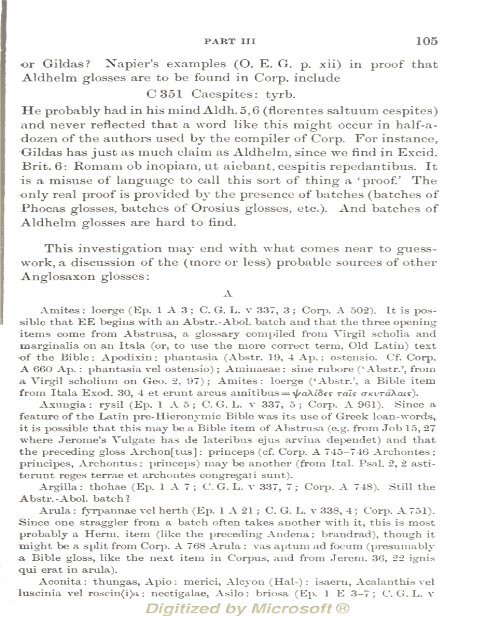the corpus, épinal, erfurt and leyden glossaries, viii - World eBook ...
the corpus, épinal, erfurt and leyden glossaries, viii - World eBook ...
the corpus, épinal, erfurt and leyden glossaries, viii - World eBook ...
You also want an ePaper? Increase the reach of your titles
YUMPU automatically turns print PDFs into web optimized ePapers that Google loves.
PART ni 105<br />
or Gildas? Napier's examples (O. E. G. p. xii) in proof that<br />
Aldhelm glosses are to be found in Corp. include<br />
C351 Caespites: tyrb.<br />
He probably had in his mind Aldh. 5,6 (florentes saltuum cespites)<br />
<strong>and</strong> never reflected that a word like this might occur in half-a-<br />
dozen of <strong>the</strong> authors used by <strong>the</strong> compiler of Corp. For instance,<br />
Gildas has just as much claim as Aldhelm, since we find in Excid.<br />
Brit. 6: Romam ob inopiam, ut aiebant, cespitis repedantibus. It<br />
is a misuse of language to call this sort of thing a 'proof The<br />
only real proof is provided by <strong>the</strong> presence of batches (batches of<br />
Phocas glosses, batches of Orosius glosses, etc.). And batches of<br />
Aldhelm glosses are hard to find.<br />
This investigation may end with what comes near to guesswork,<br />
a discussion of <strong>the</strong> (more or less) probable sources of o<strong>the</strong>r<br />
Anglosaxon glosses:<br />
Amites :<br />
A<br />
loerge (Ep. 1 A 3 ; C. G. L. v 337, 3 ; Corp. A 502). It is pos-<br />
sible that EE begins with an Abstr.-Abol. batch <strong>and</strong> that <strong>the</strong> three opening<br />
items come from Abstnxsa, a glossary compiled from Virgil scholia <strong>and</strong><br />
marginalia on an Itala (or, to use <strong>the</strong> more correct term, Old Latin) text<br />
of <strong>the</strong> Bible : Apodixin : phantasia (Abstr. 19, 4 Ap. : ostensio. Cf. Corp.<br />
A 660 Ap. : phantasia vel ostensio) ; Aminaeae : sine rubore ('Abstr.', from<br />
a Virgil scholium on Geo. 2, 97); Amites: loerge ('Abstr.', a Bible item<br />
from Itala Exod. 30, 4 et erunt arcus amitibus = \//-aXtSes' rais a-Kin-aXais).<br />
Axmigia :<br />
rysil (Ep. 1 A 5 ; C. G. L. v 337, 5 ; Corp. A 961). Since a<br />
feature of <strong>the</strong> Latin pre-Hieronymic Bible was its use of Greek loan-words,<br />
it is possible that this may be a Bible item of Abstrusa (e.g. from Job 1.5, 27<br />
where Jerome's Vulgate has de lateribus ejus arviua dependet) <strong>and</strong> that<br />
<strong>the</strong> preceding gloss Archon[tus] : princeps (cf Corp. A 745-746 Archontes :<br />
principes, Archontus : princeps) may be ano<strong>the</strong>r (from Ital. Psal. 2, 2 astiterunt<br />
reges terrae et archontes congregati sunt).<br />
Argilla : thohae (Ep. 1 A 7 ; C. G. L. v 337, 7 ; Corp. A 748). Still <strong>the</strong><br />
Abstr.-Abol. batch?<br />
Arula : fyrpannae vel berth (Ep. 1 A 21 ; C. G. L. v 338, 4 ; Corp. A 751).<br />
Since one straggler from a batch often takes ano<strong>the</strong>r with it, this is most<br />
probably a Herm. item (like <strong>the</strong> preceding Andena : br<strong>and</strong>rad), though it<br />
might be a split from Corp. A 768 Arula : vas aptimi ad focum (presumably<br />
a Bible gloss, like <strong>the</strong> next item in Corpus, <strong>and</strong> from Jerem. 36, 22 ignis<br />
qui erat in arula).<br />
Aconita: thungas, Apio: merici, Alcyon (Hal-): isaeru, Acalanthis vel<br />
luscinia vel roscin(i)a: nectigalae, Asilo: briosa (Ep. 1 E 3-7: C. G. L. v

















